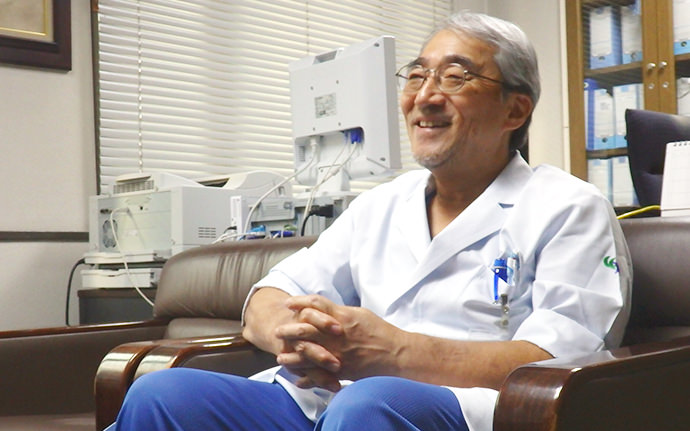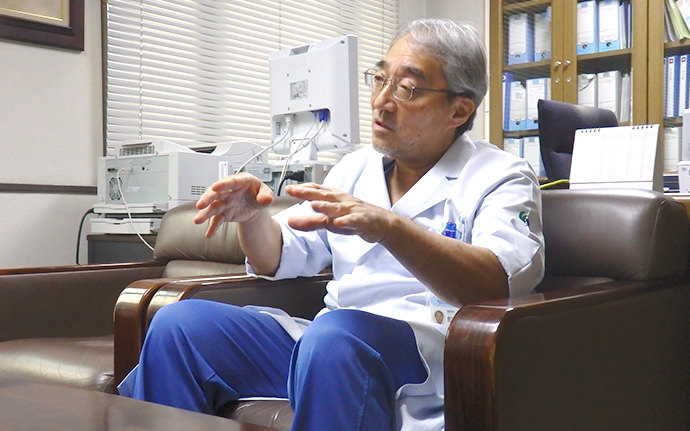
When hemorrhoids (piles) or anal prolapses become large, swelling of the affected area may cause a sensation of inadequate defecation even after stools have been evacuated from the rectum. Patients with such symptoms may use OTC drugs while checking for the effectiveness of such drugs. Hemorrhoid swelling is a circulatory disorder due to poor blood circulation. If drug therapy improves blood circulation, swelling may subside, and mild anal prolapse or a sensation of inadequate defecation may be resolved.
Anal fissure is not noticeable at first. OTC drugs are effective against minor anal bleeding. However, such a patient may have a bowel movement before the wound is healed, and anal fissure may repeatedly occur, resulting in chronic anal fissure. Therefore, caution must be exercised.
Patients with "anal bleeding" and/or "anal prolapse" should consult a physician. A sensation of inadequate defecation due to hemorrhoids (piles) or anal prolapse may be resolved by OTC drugs. However, if such a sensation or anal prolapse recurs soon after discontinuation of OTC drug use, it can be understood that the condition cannot be resolved by OTC drugs and must be treated at a hospital.
OTC drugs may be effective against mild anal fissure, during which time anal fissure may repeatedly recur before complete wound healing, resulting in chronic anal fissure. Chronic anal fissure may cause persistent pain. In severe cases, pain will persist for the rest of the day after defecation. Patients suffering from such pain should consult a physician. Although rare, chronic anal fissure may become severe and ulcerated, and the deep wound may be invaded by bacteria which will cause an abscess to form. Due caution should be exercised for chronic anal fissure.
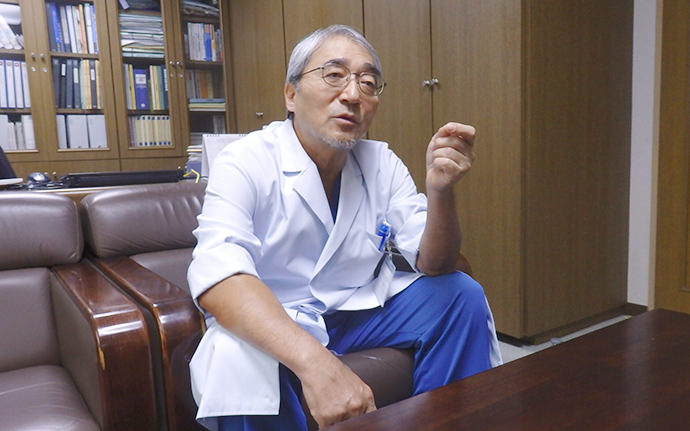
The most serious condition associated with anal bleeding and anal pain is cancer. The anal canal, which is the lower end of the digestive tract, is very richly supplied with sensory nerves. Therefore, patients may feel even a slight pain around the anus. However, since there is no nerve to transmit pain inside the area beyond the border between the intestine and anus, the patient, not feeling pain, may not notice the development of hemorrhoids (piles). The rectal and perianal regions are said to be "the second heart" with active blood circulation, and even if a small cancer develops there, cancer cells will migrate to the brain, lungs, or surrounding lymph nodes through blood and lymph vessels. When physicians examine patients complaining of "anal pain," they always check for any signs of cancer. Keep in mind that "hemorrhoids do not result in fatality but cancer does." Other than cancer, bowel diseases such as ulcerative colitis and Crohn's disease may also cause anal bleeding or pain. If you have anal bleeding, it is recommended that you promptly visit a hospital
The major cause of hemorrhoids is pressure on the anal region. Constipation, diarrhea, and sedentary work may also cause hemorrhoids. For example, there is a case in which a patient with prolapsed hemorrhoids in his/her 40s, who had been manually pushing hemorrhoids back in place, stopped experiencing prolapsed hemorrhoids after retirement. Hemorrhoids might have not become swollen because there was no pressure on the anal region after retirement. Surgical procedures may be unnecessary for hemorrhoids, and such hemorrhoids can be adequately cured by drug therapy. Hemorrhoids can be prevented not only by improvement of bowel movements, but also by elimination of possible causes.
For the prevention of hemorrhoids, a balanced diet is important, but this does not always lead to daily bowel movements. Even if elderly persons think that they are taking a balanced diet consistent with that which they had when they were young, they actually eat less as they age and as a result they have fewer feces and less frequent bowel movements. Intestinal motility, body movements and such will decrease with aging. If an elderly patient complains of constipation despite having a balanced diet, I advise the patient that "this is not constipation but is a normal body condition of patients your age." Such advice is also important in terms of patient education.
It is also important to devise ways of providing treatment according to the patient's age, such as anoplasty for elderly patients with lower anal pressures to slightly narrow the anal canal.
In the initial stage of anal fistula, pus accumulates around the anus. Such condition is called "anal abscess," which is very painful. If anal abscess feels hot or becomes swollen, visit a hospital as soon as possible. Special caution should be exercised for an abscess which has developed deep inside the anal canal. Such abscess may not be found by an internist or a physician not experienced in proctology treatment, and such a physician may prescribe antibiotics for anal pain of unknown cause, during which time the disease progresses rapidly. If the correctness of the physician’s diagnosis is doubted, consider seeking a second opinion at another proctology hospital. Patients may delay visiting a physician due to hesitation or embarrassment, but finally they will visit a proctology clinic/hospital. Therefore, proctologists should provide specialist procedures for such patients, and it is important for patients to choose a clinic/hospital where they can expect specialist procedures from proctologists.
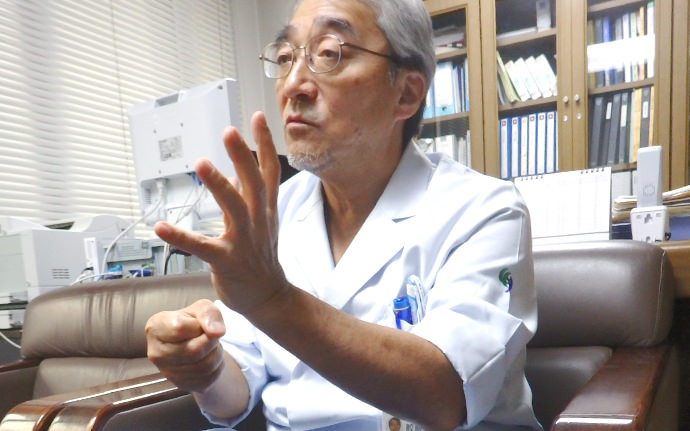
Treatment is performed on a case-by-case basis depending on the patient's symptoms. However, if the patient has typical hemorrhoids (piles), drug therapy is administered for the first 2 weeks after the initial examination to check for the drug's effectiveness. Some patients respond well to drug therapy and hemorrhoids are resolved in 2 weeks, whereas others respond to drug therapy but need longer treatment. After 2 weeks of treatment, such patients will continue to take the drug for about one month, receiving follow-up examinations. This treatment will cost approximately 30,000 to 40,000 yen. The period from the initial visit to the end of treatment is approximately one and a half months. If symptoms are not alleviated by drug therapy, other examinations will be recommended or surgery will be considered.
According to statistics at our hospital, approximately 25% of patients were diagnosed with hemorrhoids (piles) at the first visit and then underwent surgery. The hospitalization period is about 10 days for the standard surgical procedure of ligation and excision (LE). However, our hospital is located in Kagoshima and there are many patients visiting from isolated islands. Such patients cannot frequently visit the hospital and, thus, need to be hospitalized a little longer until the end of a postoperative critical period. The overall average hospitalization period is about 12 days. Surgical procedures and instruments have been improved year by year, with increased safety and substantially shortened surgery duration compared with the past. Currently, "aluminum potassium sulfate and tannic acid (ALTA) injection" is being widely used as sclerotherapy. This is a procedure in which external hemorrhoids are excised and internal hemorrhoids are treated by sclerosis injection. Since the extent of excision is half of the affected area, many hospitals in the central area of Tokyo perform ALTA sclerotherapy as outpatient surgery.
About 30% of patients with anal fissure underwent surgery at our hospital. OTC drugs may be effective against anal fissure with minor bleeding in its early stages, during which time anal fissure may repeatedly recur before complete wound healing, resulting in chronic anal fissure. In such a case, anal pain will persist for hours. In severe cases, pain persists for the rest of the day after defecation. Patients with such persistent pain must consult a physician. If patients with chronic anal fissure (even in the stage before that requiring radical surgery) visit a hospital earlier, such condition may be treated by outpatient surgery, such as anal sphincterotomy, in which the sphincter is incised to reduce the muscle tone by 20% to 30% and to allow patients to pass stools smoothly, or manual dilatation of the anus. However, such procedures are highly specialized, so patients must consult a proctologist.
Anal fistula is caused by "anal abscess" in which pus accumulates in the perianal region and which is caused by bacteria entering a small hole between the anus and rectum and causing inflammation. In some cases, anal fissure becomes severe, resulting in ulceration, and bacteria enters from its deep wound, thereby causing abscess. As anal abscess progresses, a tunnel will develop to drain pus to the anal and perianal skin, which is anal fistula. When anal fistula worsens, pus continues to drain from the hole formed on the skin. In such a state, the patient’s underwear gets soiled but pus does not accumulate and there is no pain. However, leaving anal fistula untreated may pose risks. There have been cases in which anal fistula left untreated for more than 10 years developed into cancer. There are some patients who left anal fistula untreated for years because they were planning to receive treatment after retirement but in whom anal fistula had already become cancerous. Therefore, patients with anal fistula must not delay visiting a hospital for treatment.
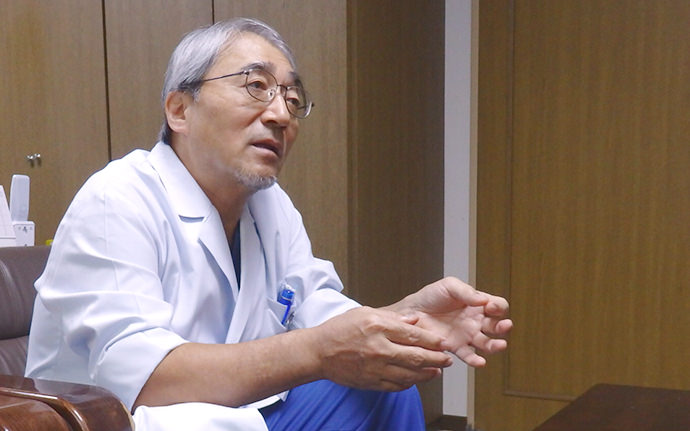
Close attention must be paid to “pain” and “bleeding” after surgery. Improved drugs can control the pain. Treatment for the bleeding is more problematic. The first postoperative bowel movement is particularly concerning, so a laxative is used to facilitate bowel movements. However, because stools pass through the surgical wound, bleeding occurs at every bowel movement until 7 to 10 days after surgery. However, if bleeding does not stop or if a blood clot passes through the anus, such conditions pose risks and the bleeding must be stopped. At our hospital, the doctor preoperatively tells the patient that "there will be slight bleeding after surgery" and gives a full explanation on postoperative bleedings, showing pictures so that the patient can distinguish between non-serious and serious bleedings. The nurses are also given specific instructions on distinguishing bleedings.
Fecal incontinence may also lead to hemorrhoids. Since the skin is weakly acidic and the intestinal fluid is relatively strongly alkaline, prolonged contact of stools with the skin may cause erosion of the anus and perianal skin. In such a case, pain will become severe and, therefore caution must be exercised. Fecal incontinence may be caused by anal disorders or may occur not in association with anal disorders. Therefore, treatment should be given after the cause of fecal incontinence has been determined. In the latter case, the cause is the functional problem of imbalance between rectal and anal movements. Various measures can be taken for patients who are suffering from incontinence while awake. Patients who are suffering from passive incontinence while asleep are severe cases. For these patients, conservative therapy, such as oral medications and rehabilitation, is performed. If such therapy is not effective, "sacral neuromodulation" is performed. This is a method to suppress incontinence using a device implanted in the buttock to deliver electrical stimulation to the sacral nerve. In Japan, it has been covered by insurance since 2014.
Food-containing dietary fiber is very good for bowel movements because it increases the bulk of stools. However, a dietary imbalance is not good. It is important to take a balanced diet. Even if dietary fiber is good for the intestines, excessive eating or drinking of foods or beverages containing dietary fiber is not recommended. In addition, there are some elderly patients who are concerned about constipation due to a decrease in fecal volume or in frequency of bowel movements; however, this may not be a cause for worry. Although many elderly persons think that they are taking a balanced diet as with that when they were young, they eat less with age and thus it is natural that they have less feces. They may also have less frequent bowel movements. For elderly patients who show no abnormality on colorectal examinations but are concerned that they have constipation despite a balanced diet, I advise them that "this is not constipation but is a normal body condition of patients your age." Such advice is also important for patients.
